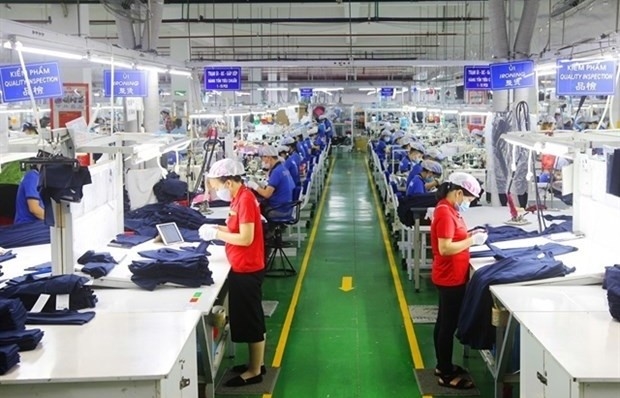Program on supporting businesses in private sector to do sustainable business in a period of 2022 - 2025
Friday, July 29,2022
AsemconnectVietnam - Sustainable development of private sector enterprises, ensuring a close, reasonable and harmonious combination of economic efficiency with social responsibility, protection of natural resources and environment, contributing to the accomplishment of 17 goals sustainable development of Vietnam by 2030
b) Specific goals by 2025
- Raising awareness of the private sector business community about the role, meaning and importance of sustainable business.
- Fostering and raising awareness and qualifications of cadres, civil servants and public employees to meet the needs of support, advice and management on sustainable business.
- Support to develop at least 10 tools and solutions to measure, evaluate and recognize sustainable business enterprises; thereby supporting about 10,000 private sector enterprises to do sustainable business; contribute to achieving the energy saving level of 5.0 - 7.0% of the total national energy consumption; increase labor productivity by about 7%/year on average.
- Forming a database and developing an ecosystem to support sustainable business enterprises.
- Build typical successful sustainable business models to spread and encourage businesses to develop sustainably.
- Attract legal resources, especially from the business community, to implement initiatives towards sustainable business.
2. Scope and audience
a) The program will be implemented nationwide in the period from 2022 to 2025.
b) Subjects:
- Private sector enterprises conducting sustainable business (hereinafter referred to as sustainable business enterprises).
- Organizations promoting sustainable business development: research institutes, universities, non-business units, enterprises, organizations with legal status to support and promote sustainable business enterprises steady.
- Ministries and central agencies; People's Committees of provinces and centrally run cities (hereinafter referred to as provincial People's Committees) and attached units; associations and organizations assigned to implement the Program's activities.
c) Sustainable business includes:
- Business model applying circular economy: is an economic model in which the design, production, consumption and service activities aim to reduce the exploitation of raw materials and materials, prolong the product life cycle, limit waste generation and minimize adverse impacts on the environment1.
- Overarching business model: is a business model that mobilizes low-income people to participate in the value chain of enterprises, production and business establishments; in which, low-income people can participate in the role of suppliers, customers, distributors or can be employees involved in production and business activities to create shared values. .
- Other sustainable business models: are business models that ensure economic sustainability, environmental protection, climate change response, and social security issues.
II. Activities of the program
1. Developing a sustainable business support ecosystem
a) Develop documents, organize information dissemination and communication through mass media and social networks in order to raise awareness of society and business community about sustainable business.
b) Organize training courses, raise awareness and qualifications of cadres, civil servants and public employees working in support and management of sustainable business.
c) Building a network of consultants to support sustainable businesses.
d) Building and developing an information platform to form a database of information about sustainable business enterprises.
Encourage and support organizations promoting sustainable business development to research, develop and apply solutions and tools to measure, evaluate and recognize sustainable business enterprises.
e) Encourage financial and credit institutions to research and develop financial and credit products and services for sustainable business; develop an information platform that connects sustainable business enterprise customers with credit institutions and investors.
g) Consulting support on financial products, services, credit for sustainable business.
h) Organize conferences, seminars, and seminars to share information, experiences and good practices on sustainable business models; measurement solutions and tools; evaluate and recognize sustainable business enterprises; connecting enterprises conducting sustainable business with credit institutions and investors; connecting typical domestic and international successful organizations, experts and businesses.
2. Support sustainable businesses
a) Enterprises that are assessed and recognized as sustainable business enterprises are supported with the following contents:
- Support consulting and training, including direct training activities at enterprises on strategy formulation, model design, and sustainable business plans; personnel; finance, production, sales, marketing, internal management and other contents related to production and business activities of the enterprise.
- Support domestic and foreign intensive training and coaching on the application and development of sustainable business models.
- Technology support includes: searching, selecting, decoding and transferring technologies suitable for enterprises; apply technical standards and regulations; expenses for inspection, calibration, testing and measurement of product and service quality; intellectual property consultancy, exploitation and development of intellectual property; consulting on the selection of digital transformation solutions.
- Support the cost of renting and buying digital transformation solutions; testing, perfecting products, sustainable business models.
- Support in accessing finance, calling for investment capital.
- Support in communication, trade promotion, market expansion for sustainable business products and services of enterprises: support for successful registration of accounts to sell products and services on trading floors international electronics; support the cost of maintaining accounts on domestic and international e-commerce platforms; support cost of venue rental, design and staging of booths, transportation of displayed products, travel expenses, expenses for accommodation and meals for representatives of enterprises participating in trade fairs and exhibitions domestic and foreign.
b) Sustainable business enterprise means a small and medium-sized enterprise supported by the state budget to perform the contents at point a of this clause according to the highest support norm prescribed in the Law on Support for Small and Medium-sized Enterprises. Decrees guiding the Law.
3. Program management activities
a) Develop guiding documents, implementation process of the Program; Develop a framework to evaluate and monitor the Program.
b) Conduct annual evaluation and summarize the implementation of the Program, report to the Prime Minister and propose amendments and supplements to the Program's contents and activities in case of necessity.
III. Cost implementation of the program
1. Funding sources
Program implementation costs include:
a) Contributions, sponsorships and other lawful financial sources of organizations, individuals and enterprises participating in the Program, domestic and foreign investment funds to implement the Program.
b) Central and local state budget funds (recurring expenditures): partial support for activities specified in Clause 1 (points a, b, c, h), subjects specified in Clause 2 (point b) ) Section II of the Program; no more than 10% of the total state budget funding to support the implementation of the Program for the activities specified in Clause 3, Section II of the Program. Other activities use socialization funds.
The central budget shall arrange for the Program's activities to be carried out by ministries and central agencies. The local budget shall arrange for the Program's activities to be carried out by the locality.
2. Principles of using funds
a) The mobilization, management, use and settlement of funding sources specified at Point a, Clause 1, Section III of the Program must comply with current law provisions. In which, funding for the Program's activities shall be used in accordance with the agreement with the sponsor (if any), or in accordance with the Program's regulations and the Program's guiding documents (in case of failure to do so). agreement with sponsor).
b) The formulation, implementation and settlement of state budget funds to support the implementation of the Program shall comply with the provisions of the Law on State Budget, resolutions of the National Assembly, resolutions of the Government, guiding documents; implementation and related legal documents, ensuring practicality, efficiency, feasibility, savings and maximum integration into other programs with objectives consistent with the Program.
IV. Organization of implementation
1. Responsibilities of the Ministry of Planning and Investment
a) Assume the prime responsibility for, and coordinate with the Ministry of Finance, the Ministry of Natural Resources and Environment, the Ministry of Labor, War Invalids and Social Affairs and relevant ministries and agencies in promulgating guidelines on the organization and implementation mechanism of the Program, ensuring feasible and effective, including guidelines on principles of measurement, assessment and recognition of sustainable business enterprises; standards and conditions for using the results of organizations to measure, evaluate and recognize sustainable business enterprises.
b) Guide the formulation and synthesis of plans and cost estimates for the implementation of the Program annually and in the period of 2022-2025 nationwide; notify the Program implementation plan according to the annual budget approved by the competent authority for the implementation of the Program.
c) Implement activities specified in Clause 3, Section II of the Program and organize the implementation of the Program within the scope and domains of its management.
2. Responsibilities of the Ministry of Finance
a) Lead and guide the mechanism of management and use of state budget funds to implement the Program, ensuring the principles specified in this Decision.
b) Assume the prime responsibility for allocating annual state budget estimates for the implementation of the Program in accordance with the Law on State Budget.
3. Ministries, central agencies, provincial People's Committees and association organizations
a) Develop an annual plan and cost estimate for the implementation of the Program, in the period of 2022-2025, and integrate it with other programs in line with the objectives of this Program (if any); send it to the Ministry of Planning and Investment for general synthesis on a national scale.
b) Assign affiliated units to act as focal points and organize the implementation of the annual Program. To evaluate and annually summarize the implementation of the Program within the scope and field of management; propose amendments and supplements to the Program's contents and activities in case of necessity; send it to the Ministry of Planning and Investment for summarizing and reporting to the Prime Minister.
c) Take responsibility for the feasibility and efficiency, save money, implement the Program according to the scope and field of management, and integrate as much as possible into existing similar programs to thoroughly save money.
d) Provincial-level People's Committees shall allocate funds for activities carried out by their localities in accordance with the provisions of the Law on State Budget.
4. Responsibilities of organizations promoting sustainable business development
a) Actively research, propose and participate in implementing specific activities to support sustainable business promotion within the scope of the Program's activities.
b) Strictly comply with the regulations guiding the implementation of the Program issued by the competent authority.
5. Responsibility of a sustainable business enterprise
a) Provide timely, complete and accurate information and documents about enterprises at the request of agencies and organizations promoting sustainable business development and take responsibility before law for such information and documents. provided.
b) Comply with the Program's regulations and guiding documents; strictly comply with commitments with agencies and organizations to promote sustainable business development.
c) Allocate reciprocal resources to receive, coordinate and organize the effective implementation of support resources.
Source: Vitic/ thuvienphapluat.vn
Program on conservation and development of Vietnamese craft villages in a period of 2021 - 2030
Implementation plan of marine aquaculture development project in Ninh Binh province to 2030 with a vision to 2045
Plan on implementing national environmental protection strategy to 2030 with a vision to 2050 in Kien Giang province
Plan on implementing Decision No. 327/QD-TTG dated March 10, 2022 of the Prime Minister approving the project on developing sustainable and effective wood processing industry in the period of 2021-2030 in Gia Lai province
Action plan on implementing strategy of sustainable agricultural and rural development in a period of 2022-2030 with a vision to 2050 in Hanoi city
Plan on implementing Decision No.923/QD-TTG dated August 2, 2022 of the Prime Minister approving science and technology program for new rural construction in a period of 2021-2025 in Vinh Long province
Plan on implementing strategy of sustainable agricultural and rural development in Bac Kan province in a period of 2021 - 2030 with a vision to 2050
Action plan on implementing livestock development strategy in a period of 2022-2030 with a vision to 2045 in Hanoi city
Implementation plan of Vietnam's forestry development strategy for a period of 2021-2030 with a vision to 2050 in Gia Lai province
National master plan in a period of 2021-2030, vision to 2050
Program on strengthening environmental protection, food safety and rural clean water supply in building new countryside in a period of 2021-2025
Digital transformation program on building new countryside, towards smart new countryside in a period of 2021 - 2025
Rural tourism development program on new rural construction in a period of 2021 - 2025
Project on development of trade, e-commerce systems and border trade in Binh Phuoc province in a period of 2021-2025, orientation to 2030

Plan on implementing Decision No. 327/QD-TTG dated March ...
Concretize viewpoints, objectives, tasks and solutions of the plan in accordance with practical conditions of the locality, associating ...Plan on implementing national environmental protection ...
Implementation plan of marine aquaculture development ...
Program on conservation and development of Vietnamese ...
Plan on improving quality of human resources to 2025 and ...

Efforts taken to turn culinary culture into national ...
The Vietnam Cuisine Culture Association (VCCA) is taking steps to implement a project to build and develop Vietnamese culinary culture ...Vietnamese cuisine making a name for itself with ...
Vietnam advance to next round of AFC U20 Women’s Asian Cup
Cultural tourism and traditional values promoted through ...



